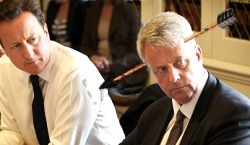 “So, first of all, let me assert my firm belief that the only thing we have to fear is fear itself…”
“So, first of all, let me assert my firm belief that the only thing we have to fear is fear itself…”
—Franklin D. Roosevelt: First Inaugural Address: Saturday, March 4, 1933
Now that the elections and referendum are over, and the results have knocked the egg out of Clegg, the talk has turned, as it will, to what the Lib-Dems must do to lay themselves sunny-side up again. The general thrust is that they need to get tough, rattle a few sabres, perhaps even fire a few arrows, and so assert their identity in the face of their coallusion partners, the Tories. A top candidate for the sabre rattling treatment is of course the NHS reforms.
Now the notion that the severity of the pasting meted out by the Tories to the Yellow Tribe might back-fire on the Tories, by provoking a Lib-Dem health service strop sufficient to scupper Broken Arrow’s NHS reforms, may be enticing, but the reality is likely to be rather different, more, one might imagine, in the manner of Mowgli standing up to Baloo:
Nick: Leave me alone.
Dave: Well, now, that’s pretty big talk, little britches.
Nick (slugging Dave): I’m big enough.
Certainly, on past performance, and here tuition fees spring to mind, Lib-Dem opposition has a habit of Macavitating once Lib-Dem ministers are safely bedded in behind Number 10’s door, as the naïve opportunism of opposition collides with the rock-face of Tory – and fiscal, not to mention governmental – reality. Dr No suspects that much the same fate awaits Lib-Dem opposition to the Tory health service reforms. Today’s huff will become tomorrow’s puff, all too soon to be blown away on the winds of political expediency.
The fact is that all political parties, once in power, are inclined to show, as our American cousins might say, hostle intent, sometimes covert, sometimes not so covert, towards the National Health Service. Labour, once seen as the party of the NHS, spent most of its last term punching private holes in the public NHS; and the Tories, now in power, have ditched their manifesto ‘NHS safe in our hands’ slogan for proposed reforms so radical that if implemented would see the National Health Service as we now know it hollowed out from the inside, and left a shallow shell of its former self, a branded franchise to be flogged to ‘any willing provider’.
The standard explanation for Tory zeal for privatisation is of course that it is all about bungs for buddies, and no doubt there is some, perhaps quite a lot, of truth in that knee-jerk response. But such an account does nothing to explain why all parties, once in power, set about carving up the NHS. There must be, Dr No supposes, some other underlying reason; and on reflection it appears to Dr No that that reason is fear.
Indeed, for some time now, the bean-counters have been frightening the pants off whoever is in power. They warn of an avalanche of the elderly swamping the country, of a silver cesspit draining the life-blood from the economy. And so it is that all parties of all colours, once burdened with the mantle of government, look at these predictions, and brown-trouser themselves; and it is from this fear that hostle intent towards the NHS is born: a crazed determination driven by fear to ‘risk-manage’ future health service expenditure by dumping it, lock stock and barrel, into the private sector.
And so it is that Dr No believes that, rather than attacking the Tory health service reforms as bungs for buddies, we should instead attack the underlying fear that drives all governments to want to ditch the NHS. We might want to point out, for example, that privatised health care on the American model is likely, at a national level, to double costs, and yet deliver worse outcomes. And, perhaps most of all, we might want to point out that this governmental fear may in fact be nothing short of an outstanding example of fear of fear itself. What if, for example, far from sucking the life-blood out of the country, the elderly in fact are net contributors to the economy, even after allowing for the burden they place on the NHS; and so the fear imaginary?
